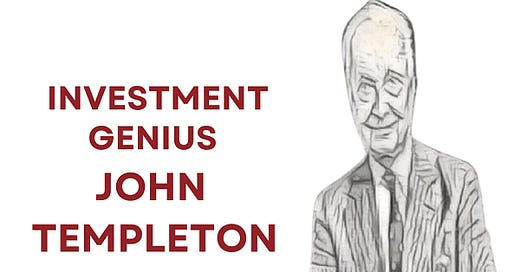The Investment Genius of Sir John Templeton
Discover Sir John Templeton’s investment philosophy, emphasizing contrarian thinking, emotional discipline, and continuous learning for long-term success.
Hi, guys! 👋
Today I'm happy to share some invaluable lessons from the legendary Sir John Templeton, one of the most successful and influential investors of the 20th century.
If you’ve ever wondered how a contrarian mindset and emotional discipline can lead to long-term success, this post is for you! Let's explore the powerful lessons from this legendary investor.
Enjoy!
And remember:
🐦 Follow me on Twitter
💼 Follow me on LinkedIn
🎉 FYI! I’ve just released a series of brand-new, free ebooks designed to help you master the strategies of some of the greatest investors of all time.
📥 Download them below!
Sir John Templeton was one of the most successful and influential investors of the 20th century. Born in a small town in Tennessee in 1912, Templeton went on to revolutionize the world of investing by founding the Templeton Growth Fund in 1954. Over 38 years, this fund delivered an average annual return of 14.5%, a testament to Templeton’s exceptional investment acumen. His approach to investing was characterized by his contrarian mindset, global perspective, and deep commitment to ethical principles. Templeton’s willingness to take positions that others avoided, combined with his relentless pursuit of knowledge and spiritual growth, set him apart as a true maverick in the investment world.
In this post, you’ll learn about the key principles that guided Sir John Templeton's investment philosophy, particularly his emphasis on independent thinking and the importance of maintaining emotional and intellectual discipline. We’ll explore how his unique upbringing, contrarian strategies, and commitment to self-mastery contributed to his extraordinary success, offering valuable lessons for modern investors.
TL; DR
Contrarian Mindset: Templeton excelled by going against the crowd, buying when others were selling, and holding firm during times of maximum pessimism.
Global Perspective: He was one of the first to see the benefits of investing globally, recognizing opportunities in markets that others ignored.
Emotional Discipline: Templeton’s success was rooted in his ability to remain calm and rational in the face of market volatility and to control his emotions.
Spiritual and Intellectual Growth: His commitment to continuous learning and spiritual development played a crucial role in his investment strategy.
The Willingness to Be Lonely
Sir John Templeton's investment philosophy was built on the foundation of contrarian thinking. He believed that to achieve superior returns, an investor must be willing to stray from the crowd and make decisions that others might consider unwise or too risky. This principle was vividly illustrated in 1939, when Templeton made a bold bet by investing in 104 American companies trading at $1 or less during the height of World War II. At a time when the world was engulfed in uncertainty and fear, Templeton's contrarian bet paid off spectacularly, turning his $10,000 investment into $40,000—a fortune at the time.
The Contrarian Mindset
Templeton’s contrarian approach was not about taking risks for the sake of being different; it was about recognizing the inefficiencies in market behavior. He understood that markets are often driven by emotion—fear during downturns and greed during booms. Templeton’s strategy was to take advantage of these emotional extremes by buying when others were selling and holding onto investments even when the market sentiment was negative. His famous quote, "The time of maximum pessimism is the best time to buy, and the time of maximum optimism is the best time to sell," encapsulates this philosophy.
This mindset requires not only courage but also a deep understanding of the underlying value of investments. Templeton’s success was rooted in his ability to identify undervalued assets that had been unfairly punished by the market. By maintaining his conviction in the face of widespread pessimism, he was able to achieve extraordinary returns over the long term.
The Making of a Maverick
Templeton's upbringing played a significant role in shaping his independent mindset. Raised in a devoutly Christian home in Tennessee, he learned the value of self-reliance from a young age. His parents encouraged him to make his own decisions and to learn from his mistakes—a philosophy that carried over into his investment career. After attending Yale University and Oxford as a Rhodes Scholar, Templeton traveled extensively, gaining a global perspective that would later inform his pioneering approach to international investing.
Templeton’s early life was marked by a strong sense of curiosity and a desire to understand the world beyond his immediate surroundings. His travels and studies exposed him to different cultures, economies, and markets, giving him a unique perspective that many of his contemporaries lacked. This global outlook became a cornerstone of his investment strategy, as he recognized that opportunities existed beyond the borders of the United States.
A Global Perspective
John was one of the first investors to recognize the potential of global markets. At a time when most American investors were focused on domestic opportunities, Templeton looked abroad, identifying undervalued stocks in markets that others ignored. His global perspective allowed him to diversify his portfolio and capitalize on opportunities that were not available in the U.S. market.
Templeton’s international investments were guided by the same principles that governed his domestic strategy: a focus on value and a willingness to go against the grain. He often invested in countries that were experiencing economic or political turmoil, recognizing that these situations could create opportunities for those who were willing to take a long-term view. His global investments were not without risk, but they also offered the potential for outsized returns.
One of Templeton’s most notable global investments was his decision to invest heavily in Japan in the 1960s, at a time when few Western investors were interested in the Japanese market. His investments in Japanese stocks paid off handsomely, as Japan’s economy boomed in the following decades. This willingness to look beyond the familiar and embrace the unknown was a hallmark of Templeton’s investment approach.
Emotional and Intellectual Mastery
What truly set Templeton apart from other investors was his ability to master his emotions and maintain intellectual rigor. He understood that investing is not just a financial endeavor but also a psychological one. By maintaining control over his thoughts and emotions, Templeton was able to make rational decisions even in the face of overwhelming uncertainty. This inner discipline allowed him to take bold risks that others would have shunned and to hold on to his convictions even when the market was against him.
Templeton's commitment to self-mastery extended beyond his professional life. He was known for his frugality and discipline in all aspects of life, from his spending habits to his time management. This disciplined approach helped him maintain a clear focus on his long-term goals, avoiding the distractions that could have derailed his success.
The Role of Spiritual and Intellectual Growth
Templeton believed that success in investing, as in life, required continuous learning and self-improvement. He was deeply committed to both intellectual and spiritual growth, believing that the two were interconnected. Throughout his life, Templeton sought to expand his knowledge, not only in finance but also in spirituality. He read widely, studied different religious and philosophical traditions, and engaged in regular meditation and prayer.
This commitment to spiritual growth was not just a personal pursuit; it also informed his investment philosophy. Templeton believed that a strong spiritual foundation could help investors maintain the discipline and perspective needed to succeed in the markets. His philanthropic efforts, particularly the establishment of the Templeton Foundation, reflected his belief in the importance of integrating spiritual and intellectual growth.
Summary
Sir John Templeton was a true pioneer in the world of investing, known for his contrarian mindset, global perspective, and deep commitment to emotional and intellectual discipline. His willingness to take risks when others were fearful, combined with his relentless pursuit of knowledge and spiritual growth, made him one of the most successful investors of his time. Templeton's life and career offer valuable lessons for investors today: to succeed, one must be willing to think independently, maintain discipline in the face of uncertainty, and continually seek to improve both intellectually and spiritually.
Download this post 👇
Got a burning question or a topic you're curious about? I'd love to hear from you! Please drop a comment 💬 below or shoot me an email 📧 at grahamqualityinvestor@gmail.com







